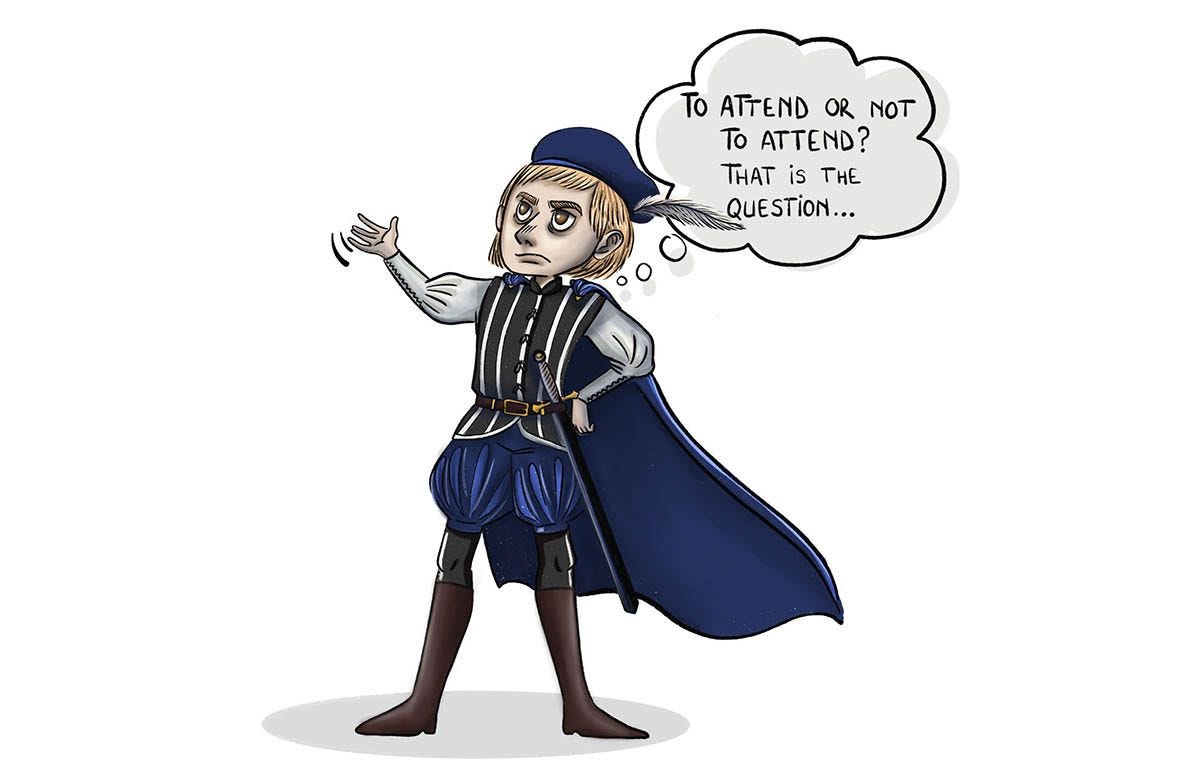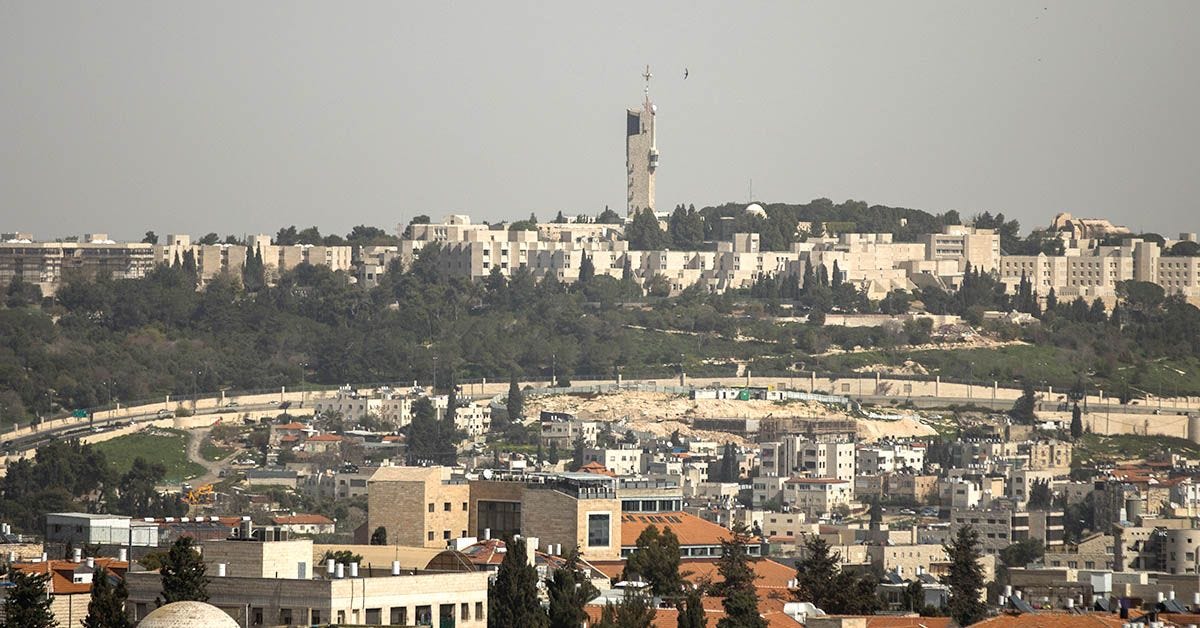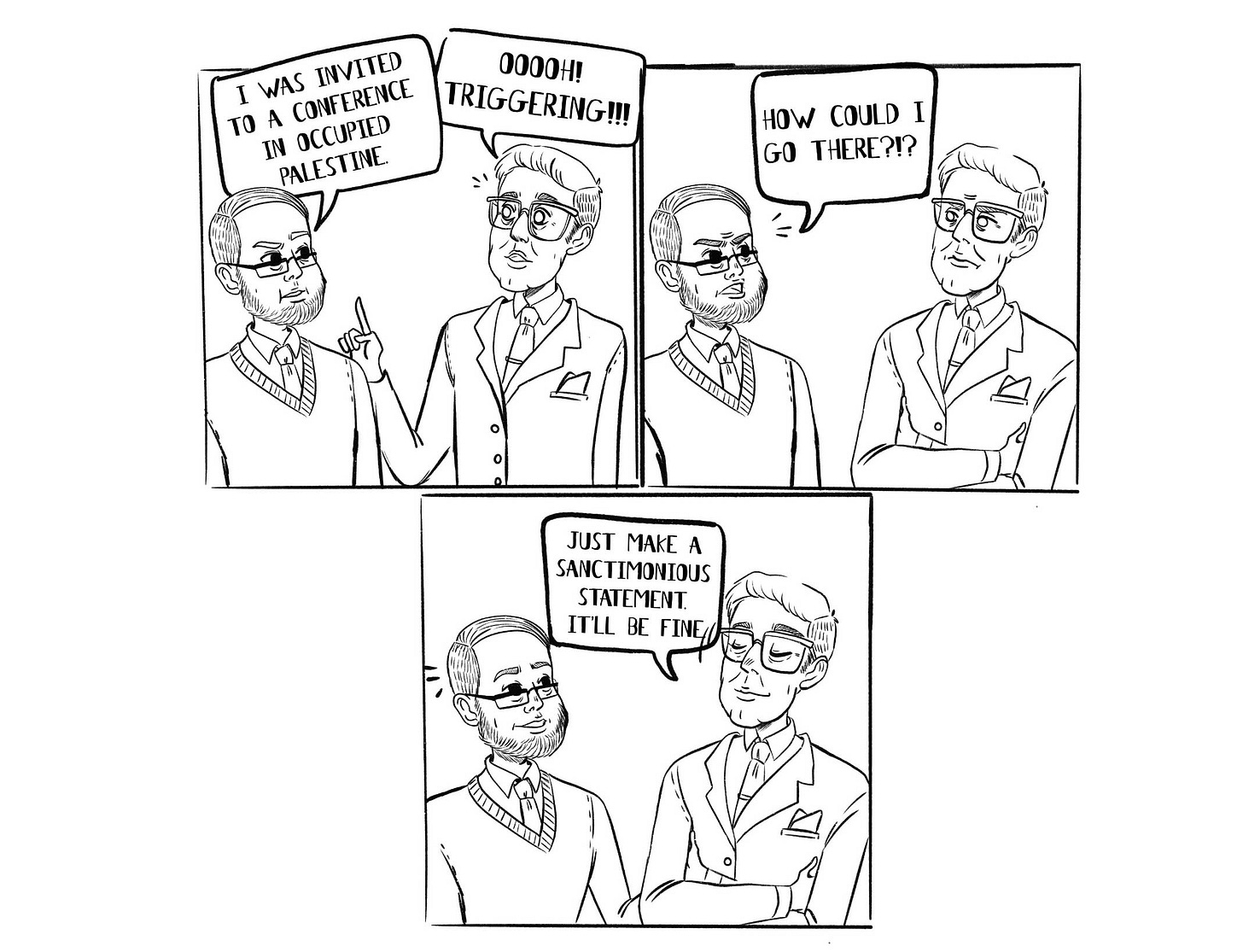Woke Academics Invited to Israel: Stay or Go?
As professor of English Literature at Bar Ilan University, William Kolbrener is on the front line of woke academia's public displays of piety in Israel
What would a scholarly talk on Hamlet be without mentioning the Israeli expropriation of Palestinian land?
This happened, this past year at one of the world's great research centers, the Israel Institute for Advanced Studies at the Hebrew University of Jerusalem. During my one-year tenure as fellow, I had the privilege to work with extraordinary scholars of unassailable pedigree from Europe, the U.S., U.K., and elsewhere.
This has also been the year that I experienced, directly and personally, the undermining of the Humanities, not from the external financial pressures from an increasingly STEM-based university, but also, and even more depressingly, from within. [1]
I live in an ultra-Orthodox community in Jerusalem, and today’s “progressives” may well outdo my Haredi neighbors in their public expressions of uncompromising belief.
I. A BRIEF HISTORY OF THE “WOKE ACADEMY”
Living in Israel (as I have since 1992), I had followed the slow, creeping evolution of the “Woke Academy” since I left Columbia University in NYC – where I received my PhD in English in the 80s. I resisted then believing what American colleagues have now been telling me for some time, that the edgy critical theory that helped shape me as a scholar had transformed, over the decades, into an orthodoxy.
At Columbia, I studied post-structuralism, deconstruction and Marxist cultural theory. Coming out of Roslyn, one of Long Island's premier upper-middle class suburbs, literary theory taught me that criticism almost always begins with an external perspective of questioning. Further, if we can speak of something called ‘truth,’ it also includes whatever is discovered reading from more than one perspective. The pursuit of truth must be a process; progressive academics, in the name of pluralism, multiplicity and the newly-coined ‘intersectionality,’ demand assent to a set of already-decided positions.
What I saw this year at the Institute is that curiosity has been replaced by close-mindedness and creativity stifled by orthodoxy. Puritanism has always gripped the right in America, but messianic piety has now overcome the left as well.
I live in an ultra-Orthodox community in Jerusalem, and today’s “progressives” may well outdo my Haredi neighbors in their public expressions of uncompromising belief. If I were to advertise my religious views with a similar degree of enthusiasm, my academic colleagues would likely cancel me, disavow me as a fanatical extremist.
In academia, this public piety demands allegiance without exception, mandated by the professional and economic pressures of publication, promotion, the job market. The American Puritan legacy lives on, with academics feeling the burden of the Original Sin of their privilege, unbearable and irredeemable. Part of the reason progressives take refuge in their self-affirming bubbles is that guilt takes priority over action. Self-righteous posturing is much easier than actually doing something.
One American scholar initially declined to come because of ‘the Occupation.’ In the end, he showed up; not, however, without indulging in an encore performance, which consisted of a proclamation that he would only patronize the businesses of Palestinians.
Woke virtue-signaling – or Public Displays of Piety [PDPs] – have become the academic version of genuflecting. Post-colonialist humanists condescend to monotheistic belief, but practice their political faith with fervent and public devotion. In the Woke Academy, uniformity has become a virtue, with no accommodation of any measure of dissent. How many times must scholars preface talks about women’s writing, with apologetic qualification – recognizing, with gravitas, that it goes without saying that gender is a social construct.
II. ISRAEL IS PRIME TIME FOR PUBLIC DISPLAYS OF PIETY
Israel is the “Big Show” for PDPs. Scholars do not attend every academic conference to which they are invited. But instead of declining graciously, invitees to the Institute’s year-end conference recounted their agonizing personal struggles – how their sense of justice prevented them from attending.
One American scholar initially declined to come because of ‘the Occupation.’ In the end, he showed up; not, however, without indulging in an encore performance, which consisted of a proclamation that he would only patronize the businesses of Palestinians. This perspective betrays a precious naivete about how simplistically the good and bad guys, Israelis and Palestinians, might be separated. It also suggests a willed ignorance, that the Rothschild-funded institute is not tainted by Zionism’s ‘dirty money.’ The message, however, was clear: I am speaking here at your conference in Israel, ‘I am taking your money, but I disapprove of you.’
Then there's the refusal letter as personal memoir: 'I would like nothing more than to talk about conceptions of truth in early modern and Enlightenment Europe with you all.’ She goes on, providing a fiction of balance, to describe her research into the matter: ‘I have been talking with Palestinian colleagues about the request made by Palestinian civil society that academics boycott formal engagement with universities in Israel.’ But the ‘research’ – Palestinian colleagues only – is just a pretext for a refusal already determined.
‘You might want to go,’ I suggested, ‘on a tour giving a different perspective.’
But the blind faith of the converted: ‘our BTS guide gave us – he felt duty-bound to do so – a balanced perspective.’
Then there's the reporting of the interim anguish, the mandatory consultation and soul-searching, an important part of the refusal genre: ‘I struggled for three days,’ but arrived at the inevitable: ‘I have decided to join the institutional boycott.’ And, finally, lest we doubt the writer’s sincerity, she adds the triumphant declaration of ‘Solidarity!’ with ‘Palestinian civil society.’ If she knew anything about life in Gaza and the West Bank, especially attitudes towards LGQBT and a litany of other woke priorities in America, she would be horrified.
What happened to: ‘Sorry I can't make it; thanks for the invite’?
But when it comes to Israel/Palestine, progressives cannot pass up an opportunity for virtuoso virtue-signaling. Do these same uber-principled scholars, tormented by the agony of the Israeli-Palestinian conflict, reject five-star invitations to the Doha Series in Qatar with the same vigor? Do they decline research grants made by regimes with unsavory human rights records with equal determination?
Israelis – Jews – are not an accidental omission from progressive intersectionality, a supposedly all-inclusive pluralism. But the exclusion is definitive of the woke worldview.
‘Let’s sublimate all our anxieties about nationalism and religion in relationship to the “ethno-nationalist” and “settler” Jewish State.’ To do this, in our visits to Israel, we will take Jewish Voices for Peace [2] tours of Hebron, we will see the separation wall in Bethlehem, we will dwell with Palestinian locals in the Hebron Hills, but we will not (some Institute fellows spend a whole year in Jerusalem) visit the Western Wall tunnels
Literary critics condemn allegories for oversimplifying human experience, but in the fairytale thinking about Israel/Palestine, real-life allegory returns – the story of Good Palestinians and Bad Israelis. Facts to the contrary do not matter. They are ruled out as irrelevant for not fitting within the already-established narrative. The recent incident in which Palestinian journalist Shireen Abu Akleh was killed provides a version of this in small. The account given by Aljazeera on Twitter, ten minutes after the event, became authoritative, making any further revelations, including the Biden Administration’s assertion that the bullet did not provide conclusive evident about who actually shot it – irrelevant. In the horror story in which Israel is always cast as evil incarnate, even if the Israelis did not kill her, they surely wanted to.
While progressives decry traditional religious belief as retrograde and oppressive, they adhere to their woke orthodoxy with fanatical zeal. One participant’s radicalization after a Breaking the Silence [3] tour of Hebron, trumpeting his lifelong belief in ‘social justice’ morphed into an evangelical anti-Zionist fervor. For a while, I tried to appeal to his sense of fairness, a willingness to consider different perspectives. But I met with the same self-satisfied one-sidedness that I have seen in the most ideological and close-minded religious Jews.
‘You might want to go,’ I suggested, ‘on a tour giving a different perspective.’
But the blind faith of the converted: ‘our BTS guide gave us – he felt duty-bound to do so – a balanced perspective.’
Any Israeli knows that no single guide or tour can give a balanced perspective: everyone is invested. Anyone who claims to do so is disingenuous. Naturally, the City of David, a site dedicated to Israel’s biblical past, was a non-starter – ‘who can rely upon settler guides?’ But the BTS tours were led by honest brokers. Unquestionably.
III. ANTISEMITISM THRIVES IN THE HUMANITIES
Antisemitism in the progressive academy is tragic for the Humanities, but worst for aspiring humanists. Early career scholars, instead of following their interests and curiosity, are always looking over their shoulders, making sure they adhere to the ‘latest thing,’ the theoretical flavor of the month. In this New Scholasticism, agreement on ever more specialized languages and phraseology leads to questions and answers which make sense only to the initiated. At the year-end conference, terms for new concepts floated over the conference table: ecosystem, ecology, transhuman, alterity, rhizomatic, globalization. A language for initiates.
That Jewish academics are caught up in woke antisemitism is even more tragic. With their perverted sense of Jewish chosenness, they ally themselves with the reawakened forces of antisemitism, not from the right, but from their progressive left. Yet they do not see it.
Footnotes, as long digressions within talks, swell with names and references – more evidence of scholarship as affiliation. The papers may have advocated a post-colonialist perspective, but they were colonialist in their practice – allowing only one response – agreement. Many academics today – especially the young scholars coerced into intellectual straitjackets – are waiting for a return to sanity in the Humanities, for permission to think and speak, to pursue the not-yet-thought or known.
In the meantime, as humanists as well as some social scientists feel increasingly irrelevant, they protest in ways which make them even more so. One visiting scholar proclaimed his work on Shakespeare to be a tikkun olam, or “repair of the world.” The chutzpah of his assertion, however, was received with subdued reverence. [4] Worse than the endless PDPs are the pressures put on some colleagues, year-long fellows, for even having agreed to come to Israel. Visiting the Jewish state, even the highly prestigious IIAS, can result in boycott and the equivalent of internal university exile. Graduate students find new advisers, colleagues cancel them. This is happening not to Trump Republicans, but bona fide American progressives.
IV. JEWISH COMPLICITY IN ANTISEMITIC WOKE CULTURE WARS
That Jewish academics are caught up in woke antisemitism is even more tragic. With their perverted sense of Jewish chosenness, they ally themselves with the reawakened forces of antisemitism, not from the right, but from their progressive left. Yet they do not see it. They forget or never knew that the Holocaust was a culmination of millennia of antisemitism, not some one-off in a history of so-called Jewish privilege. Instead of feeling responsible to that privilege, they do their best to undermine it.
Their Jewish predecessors from the 50s and 60s, instead of canceling English Literature (and when you think of it, why not?) became experts (and then deans, and rectors, and university presidents). This is Judaism's most important lesson: move beyond the repetitious stories of fatalistic despair and learn to live with loss. But today Jews prefer to cancel others, even if it means, as it will in the end, to being cancelled themselves. Instead of the liberal maxim of Harvard philosopher Hilary Putnam – ‘enough is not everything, but enough is enough’ – today’s progressive left embraces the All or Nothing of fundamentalism. The tragic irony is that medieval thinking – the New Scholasticism – is taught in the name of diversity and critical awareness.
Those who did pay attention when they visited understood that Israel/Palestine is, in literary terms, a complex and often impenetrable signifier. Israel’s story will never conform to one single tidy narrative – whether left or right. The colleagues who dared to look closely, who momentarily suspended the simplistic story of Good vs. Evil were surprised by how Israeli and Palestinian presents and futures are interconnected; how Israeli-Arabs have become a significant and evermore visible presence in the Israeli economy; how instructors, like my colleagues in the English Department at Bar Ilan University, are trying to build educational frameworks of respect, tolerance, and even community. Beyond the virtue-signaling, pedagogues are rolling up their sleeves and getting down to the real work to be done.
Woke consciousness may be creeping into parts of the Israeli academic scene, but we are not all as far gone as our American counterparts. Our classrooms, away from missiles and terrorist attacks, are the genuine safe spaces in which students can comfortably let their defenses down and allow themselves to challenge and be challenged, to understand the possibility of learning from one another.
Progressive pedagogy, by contrast, programs its own demise with every interaction under suspicion as either potential conquest or seduction: why trust teachers? Freud and Foucault are not wrong, but the extreme suspicion justifies the militant identity politics of the American classroom: ‘don’t you dare talk to me!’ The message is: distrust encounter.
Teaching is political – but in the sense of teaching students not what to believe, but how to believe – as a matter of choice. This is the universalism that connects us, that we all consciously choose our beliefs, and that we must leave room for others to do so as well. As the first century rabbi Hillel the Elder said living under the absolutist rule of Roman Emperor Augustus (63 BCE to 14 CE): ‘that which is hateful to you, do not do unto your fellow.’ When living under a dictator, you know the virtue of being left alone.
Hillel’s statement predates by two millennia the more modern articulation of the concept of “negative liberty,” coined by the famed Oxford scholar, Isaiah Berlin, which values the freedom of being kept safe from the coercive good will of others. The humanities are the bulwark in a democratic society against encroaching absolutism.
Believing in the humanities does not mean throwing in one’s hat with the political and religious absolutism of the right. Real humanists disrupt the simplicity of ideologues both left and right. Real teachers – some of us can remember them – encourage questioning, not stepping in line.
Teaching is political – but in the sense of teaching students not what to believe, but how to believe – as a matter of choice. This is the universalism that connects us, that we all consciously choose our beliefs, and that we must leave room for others to do so as well.
The antisemitism, masquerading as anti-Zionism, I confronted this past year is central to the progressive perspective: it is the ‘tell’ for every other woke position. You can’t be progressive without questioning Israel’s right to exist.
Last year at IIAS, I saw for myself how much antisemitism permeates the academy.
We cannot, as many blithely claim, do without the Humanities. More than ever, in our tech-driven society, we must turn to art, literature, and philosophy to remember who we are, and who we can be. The works of the past nurture the critical thinking which protects us from fundamentalisms, right and left.
By confronting antisemitism in the Humanities, we must do what we can to save them.
Editor's Notes
1) STEM – Acronym for “Science Technology Engineering, Mathematics” – a catch-all phrase which describes the imperatives of the contemporary American university. Current administrations tend to use the term as a budgetary bludgeon against all other fields, especially the Humanities.
2) Jewish Voice for Peace is a U.S.-based organization that describes itself as being left-wing and supports BDS. Among its advisory board members are Judith Butler and Noam Chomsky.
3) Breaking the Silence – Founded in 2004 by IDF veterans, BTS is committed to exposing what it considers to be abusive and/or unlawful conduct by the IDF, primarily through testimonies provided by (almost always) anonymous soldiers. The group also leads tours of the most tense areas of Hebron.
4) The concept of “tikkun olam” – or, repair the world – is a core aspiration in Judaism. Modern American Jewish culture has tended to distort this belief to mean that Jewish people are meant to address all injustice. Such a malleable approach politicizes the idea, which quickly becomes a very subjective concept that has little to do with more traditional Jewish interpretations of tikkun olam, which was focused on preserving social order and preventing idolatry.




